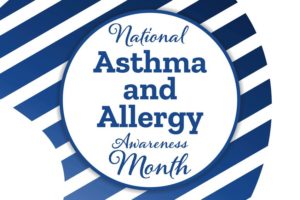
Welcome to National Allergy/Asthma Awareness Month

You don’t have to be an environmental air testing expert to know that something’s up. People are sniffling, sneezing and sporting red, itchy eyes. What could be causing their distress? Here’s a hint… the answer is blowing in the wind.
That’s right, it is allergy season, and the air is full of pollen.
From what we are hearing, this year’s allergy season is a nasty one. Trees, grass and ragweed pollen are all circulating in the air right about now. And if you have allergies, you know that there could also be mold and dust to contend with as well.
Improve Indoor Air Quality to Ease Allergies
According to the Asthma and Allergy Foundation of America (AAFA), “About 24 million Americans have hay fever, rhinitis, or nasal allergies (19.2 million adults and 5.2 million children)4” (You may have seen some of them at store, stocking up on tissue and antihistamines.)
If you or someone you love suffers from seasonal allergies, there are things you can do to improve your homes’ indoor air quality. The AAFA says there are things you can do to improve indoor air quality and create a healthier home environment.
Among their suggestions are:
- As we have learned with Covid-19, ventilation is important. If you leave interior doors open and run the exhaust fan in your bathrooms and kitchen, it will enhance air flow in your home.
- “Avoid harmful products (like bleach and other harsh cleaners) as much as possible,” the experts at the AAFA say. Why? They could release volatile organic compounds, or VOCs, into the air.
- The humidity level in your home are also important. “Keep it below 50%,” the AAFA recommends. “If you live in a wet climate, you may need a dehumidifier.”
- Close the windows when pollen levels are high.
- The AAFA also recommends that you, “Remove items with strong scents like candles.”
If you follow these and all the recommendations offered by the AAFA and are still having problems, it may be time to schedule professional Allergy Testing, which can include mold testing and VOC testing.






